Finding relief from irritable bowel syndrome (IBS) can be a daunting task. While around 11% of the population is dealing with symptoms of this condition, like belly pain, bloating, constipation, and diarrhea, there aren’t clear answers for what can help, partly because each case is different. (1)
While diet and lifestyle changes are the most common treatments, probiotics may be another solution. Probiotics are living microorganisms that have health-promoting benefits. They are present in certain foods but are also available in supplements. By supporting a healthy digestive system, probiotics have the potential to ease some IBS symptoms. (2)
There are many probiotic supplements on the market, and not all are right for every IBS condition. Our team of health and nutrition experts have reviewed the top probiotic supplements. We’ve looked at their ingredients, clinical evidence, probiotic strains, and dosages to determine the best probiotics for IBS relief. We’ve also considered cost, storage needs, and brand practices to give you the information you need to make the best choice for your gut health.
Editor’s choice
Ritual Synbiotic+ is our editor’s choice probiotic supplement pick for IBS relief.
- This comprehensive, three-in-one product combines prebiotics, probiotics, and postbiotics for optimal gut health.
- Delayed-release capsule technology maximizes effectiveness, and its fiber-free prebiotic can help even the most sensitive people.
- Each one-capsule serving contains 11 billion CFUs.
Medical disclaimer: This article is intended for educational and informational purposes only. It is not intended as a substitute for medical advice. For health advice, contact a licensed healthcare provider.
Our picks for the best probiotic for IBS
- Best pre/post probiotic for IBS: Ritual Synbiotic+
- Best for diarrhea: VSL#3 Probiotic Medical Food Capsules
- Best for women: Nutricost Probiotic for Women
- Best for constipation: Pendulum Akkermansia
- Best for bloating: Ora Organic Trust Your Gut
- Best for men: Sports Research Daily Probiotics
How to choose the best probiotic for IBS for you
When selecting a probiotic for IBS, consider the following important factors to find the most effective options for your needs.
Strain
Different strains of probiotics can have different effects on your body. Choose strains supported by science to match your specific health background.
Dose
Probiotics are measured in colony-forming units (CFUs), which tell you how many live bacteria are in each dose. While there’s no standard probiotic dose, most supplements contain around 1 billion to 10 billion CFUs, however, as seen above, can increase up to 100 billion CFUs per dose. Ensure the CFU count on the label is for the expiration date, not the manufacture date, so you know the probiotics will stay active for the whole shelf life. (2)
Storage
While many probiotics are shelf-stable, some require refrigeration. Make sure you choose an option that fits your lifestyle needs.
Quality and brand reputation
Choose probiotics from reputable brands that provide clear labeling and are third-party tested for quality and efficacy.
Form and delivery method
Probiotics come in various forms, including capsules, powders, and liquids. Some might be more convenient for you to take regularly. Also, choose an option designed to survive stomach acid, such as a delayed-release capsule, so the probiotics make it to your intestines.
Compare probiotics for IBS
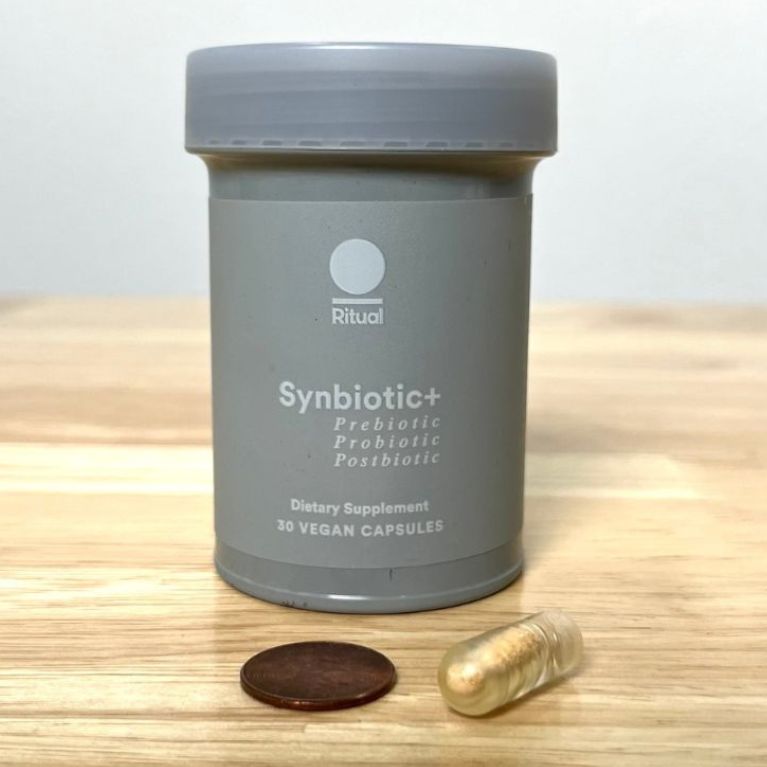
|
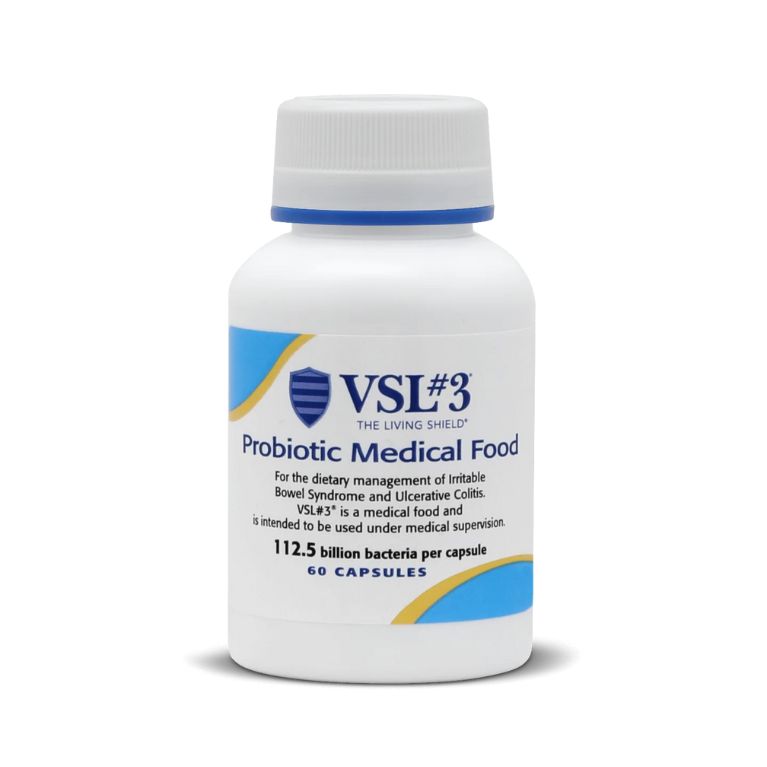
|
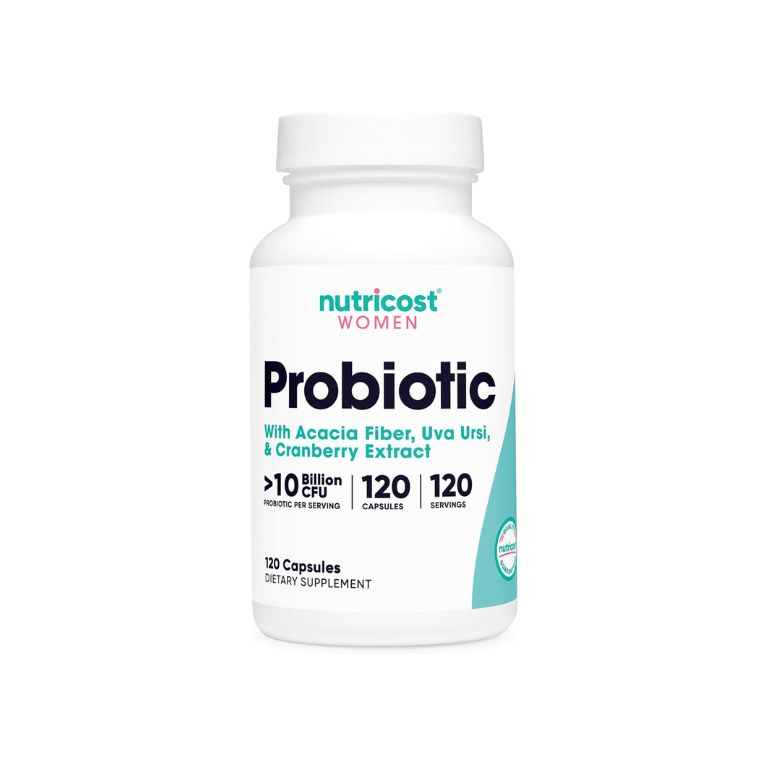
|
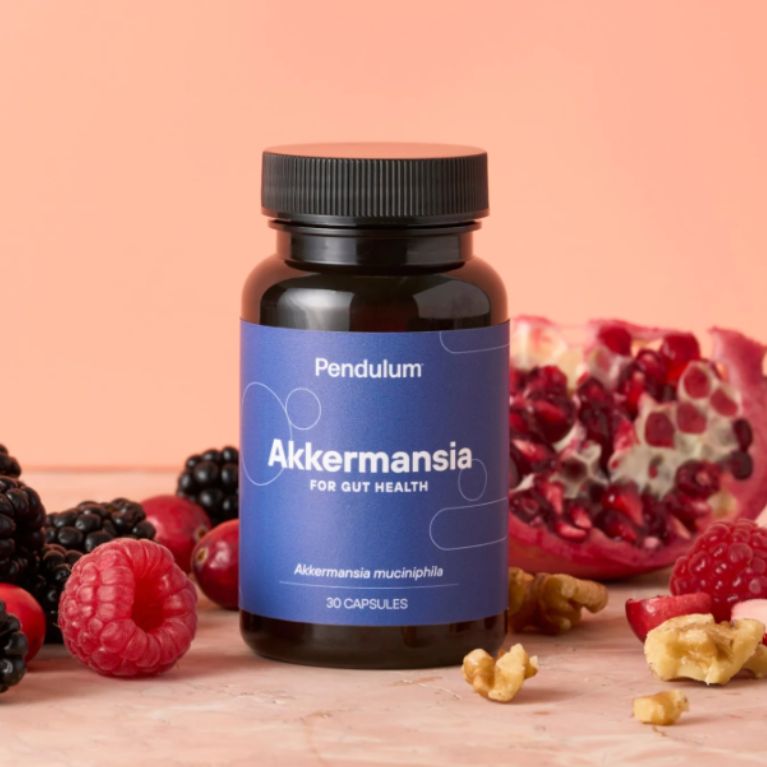
|
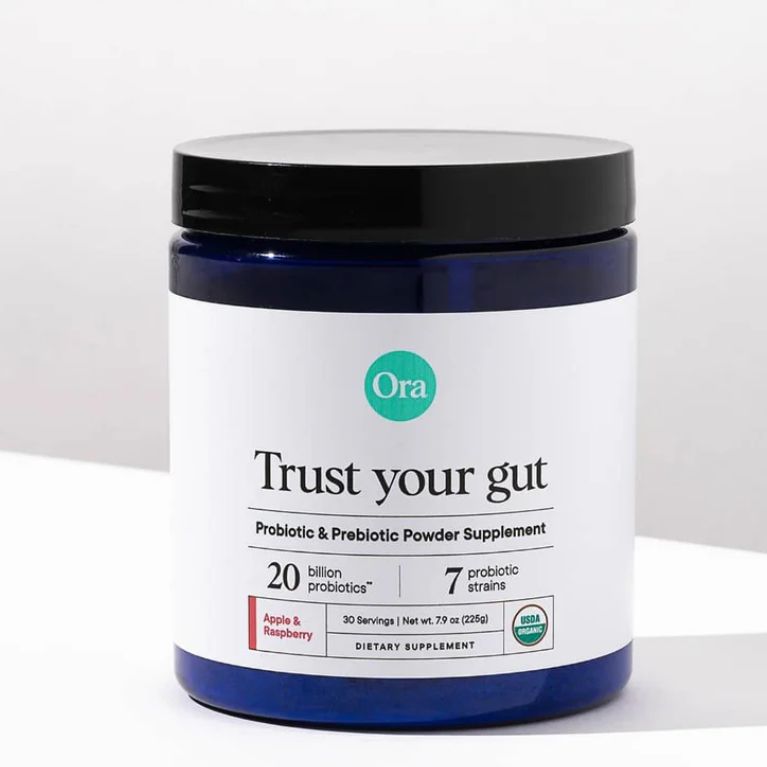
|
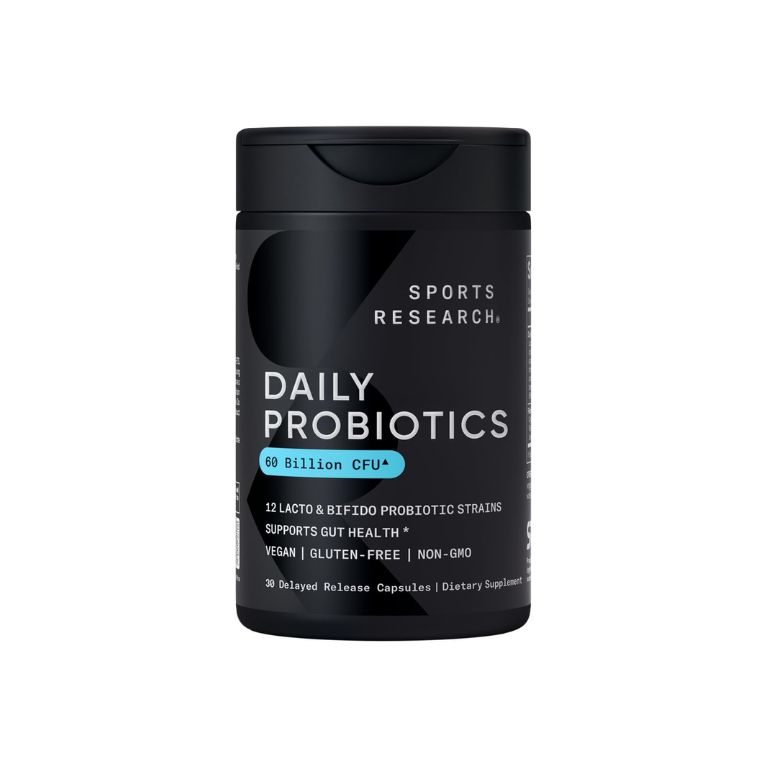
|
|
| Ritual Synbiotic+ | VSL#3 Probiotic Medical Food Capsules | Nutricost Probiotic for Women | Pendulum Akkermansia | Ora Organic Trust Your Gut | Sports Research Daily Probiotics | |
| Rating | ||||||
| Cost per serving | $1.80 | $2.20 | $0.15 | $2.97 | $1.67 | $0.93 |
| Probiotic strains | 2 | 8 | 10 | 1 | 7 | 12 |
| CFUs | 11 billion | 112.5 billion | 10 billion | 100 million AFUs | 20 billion | 60 billion |
| Dosage | One capsule daily | Two capsules or one powder packet up to 4 times daily | One capsule daily | One capsule daily | One scoop | One capsule daily |
Best pre/post probiotic for IBS: Ritual Synbiotic+
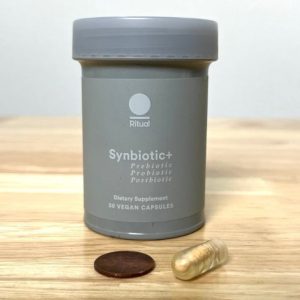

Key product features
What you should know
Ritual Synbiotic+ is a top choice for irritable bowel syndrome relief due to its comprehensive blend of probiotics, prebiotics, and postbiotics that help balance the gut microbiome. Clinically studied and third-party tested, it may effectively support multiple aspects of digestive health.
- Synbiotic+ has ingredients that can help relieve IBS symptoms caused by an unbalanced gut microbiome in doses supported by clinical research. Many users report positive results, such as reduced bloating and pain, though some have issues with the packaging and mint flavor.
- While the cost is $1.80 per dose, combining three supplements in one provides substantial value.
- This product contains probiotic strains that may particularly benefit those with IBS-related constipation.
- The supplement uses a delayed-release capsule to ensure probiotics reach the lower digestive tract.
Why we like Ritual Synbiotic+ as best pre/post probiotic for IBS
Ritual Synbiotic+ earns the title of best pre and post probiotic for IBS thanks to its comprehensive approach to gut health. As the name suggests, this product is more than just a probiotic—it also contains prebiotics and postbiotics. We call this trio a synbiotic because each substance works in synergy to optimize gut health.
Why does this matter for IBS? Because while many factors can cause IBS symptoms, an out-of-whack gut microbiome is a common culprit. When harmful microbes outnumber healthy ones, they can impact your digestive, immune, and metabolic health. Synbiotics can help rebalance your system by introducing more healthy microbes and giving them the nutrients they need to succeed. As a result, you may see improvements in common IBS symptoms like diarrhea, constipation, bloating, and belly pain. (1, 5)
Many synbiotic supplements are available, but Ritual Synbiotic+ stands out because of its ingredients. Included are two probiotic strains specifically researched for their IBS benefits: Lactobacillus rhamnosus (LGG) and Bifidobacterium animalis ssp. Lactis (BB-12). A review of multiple studies indicated these two may help provide overall IBS symptom relief and may specifically help IBS constipation. (6)
Probiotics have no precise dosage, but most supplements provide between 1 and 10 billion CFUs. Synbiotic+ provides 11 billion. CFUs stands for colony-forming units, a measure of the number of live organisms present. (2)
“Most of the research on pre- and post probiotics is strain and outcome specific, yet there’s often a mismatch between the finished product and the claims. It’s nice to see when products use strains that have actually been measured in research studies,” notes Chris Mohr, PhD, RD.
Additionally, Synbiotic+ uses a non-fiber-based prebiotic. This is a big deal for people with IBS who can’t tolerate fermentable prebiotic fibers, like inulin, used in most other supplements. Ritual also uses delayed-release capsule technology, which helps ensure the probiotics survive the journey through your digestive tract and reach your gut, where they provide the most benefit.
Beyond the stellar formulation, we rated Ritual Synbiotic+ a five out of five for ingredient transparency. Ritual provides complete visibility into individual ingredient dosing and sourcing. This product is also third-party tested to verify ingredient quality and certified clean label.
What to consider
These benefits are packed into a single capsule serving, costing $1.80 per dose. The price is high compared to many other probiotics on the market, but the three-in-one formula adds value. Some users report the packaging can be challenging to open.
What customers are saying
Ritual Synbiotic+ has a 4.1 out of 5 rating from 1,181 Amazon customer reviewers. Most customers are pleased with the results and appreciate that the pill, while somewhat large, is easy to take.
“This product changed my life. Gone are bloating, stomach pain, constipation, and spending hours in a restroom each day. My stomach is flatter, and I feel lighter and better.”
Wendy S., verified Amazon customer
Customer Regina Phalange is also “very happy” with this product, commenting, “I have never had luck with probiotics. They always gave me a stomachache. I’ve had no issues or other side effects taking these. Halfway through the bottle I am seeing that they are working. The mint is surprising at first…kind of like swallowing a small piece of candy cane. But you get used to it. Almost refreshing.”
However, some customers are unhappy with the packaging and find the mint flavor off-putting. Margaret Mart reported it comes in an “almost impossible to open container,” while another Amazon shopper “couldn’t get past the strong flavor that stayed with me for hours.”
Specs
| Probiotic strains | Lactobacillus rhamnosus (LGG), and Bifidobacterium animalis ssp. Lactis (BB-12) |
| CFUs | 11 billion |
| Other active ingredients | Prebiotics 15 mg (PerforPro®) and postbiotics 300mg (Tributyrin) |
| Other ingredients | Vegan capsule (hypromellose, gellan gum), medium chain triglycerides (from coconut) inner vegan capsule (hypromellose), silica, cellulose. |
| Format | Delayed-release capsule to resist stomach acid |
| Certifications | Third-party tested, clean label project, carbon-free fund, non-gmo |
| Special diets | Vegan, gluten-free, major allergen-free |
| Dose | One capsule |
| Cost per dose | $1.80 |
| Doses per container | 30 |
Best probiotic for IBS diarrhea: VSL#3 Probiotic Medical Food Capsules
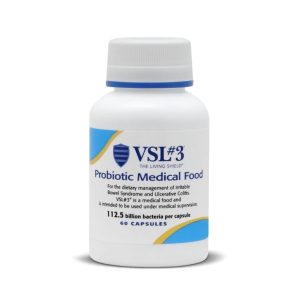

Key product features
What you should know
VSL#3 is a high-dose probiotic classified as a medical food, not a supplement. Designed to treat digestive issues like IBS, it’s one of the only probiotics subject to FDA scrutiny, ensuring high quality and safety standards.
- Many customers report improvements in overall IBS symptoms within the first month, but results vary. We like the option of choosing either a powder or capsules.
- This supplement is the most expensive option on our list, costing between $2.20 and $3.77 per dose, but it offers potential savings through subscriptions or HSA/FSA accounts. The fact that it’s so well-studied adds to its value.
- This product is ideal for individuals who want a medical-grade probiotic to manage IBS symptoms with their healthcare provider’s guidance.
- It requires refrigeration to maintain the efficacy of the probiotics, so it’s not a great choice if you travel frequently.
Why we like VSL#3 Probiotic Medical Food as best for diarrhea
VSL#3 Probiotic Medical Food is our pick for the best probiotic for IBS diarrhea (IBS-D) because research shows it works. Many supplements contain clinically studied ingredients, but manufacturers don’t test the whole product. This is not the case with VSL#3. Several studies have looked at how this specific product helps with IBS symptoms. Researchers found that taking VSL#3 for four weeks can improve IBS symptoms as well as a low-FODMAP diet. (7)
Why does it work? It’s not completely understood, but these results could be from the product’s eight probiotic strains working together to strengthen the intestinal barrier. Your intestinal barrier is the lining of your gut that separates your internal digestive system from the rest of your body. People with IBS often have a weaker barrier, and diarrhea is a common symptom of this. (8) This regulation also includes microbial composition of the gut.
“Once again, we’re seeing a product with actual clinical research measuring the effects on the desired outcomes and with great results. This should be encouraging for those who suffer from any of the GI issues where VSL#3 has been studied to see if it can support better health for them, as well.”
Chris Mohr, PhD, RD, Fortune Recommends Advisor
You can choose between two doses, depending on if you want a capsule or powder. A two-capsule dose contains 112.5 billion CFUs, while one powder dose contains 450 billion CFUs. These are large doses compared to other supplements. The jury is out on whether more is better, but theoretically, higher doses can increase the chances of healthy microbes reaching the gut. (1)
What really sets VSL#3 apart is that it is a medical food, not a supplement. This means it has to meet strict FDA standards for quality and safety, helping you trust what’s inside. However, since it’s considered a medical treatment, you should use it under a doctor’s guidance.
We like that you can order this product in single or multi-packs to save on shipping. You need to combine the powder with cool liquids to protect the probiotics, but customers report it doesn’t taste great. One packet is recommended up to four times per day. If you opt for the capsule, the recommended serving size is two capsules up to four times per day, taken with cold beverages only. Note that the capsules are big, but by all accounts easy to swallow.
Importantly, you need to keep this product in the fridge so those healthy microbes stay active. VSL will cold ship them, so you’ll need to be ready to receive them and transfer them to your refrigerator. If you travel frequently, these aren’t going to be a good fit. Additionally, due to their temperature sensitivity, they are not returnable.
What to consider
Be prepared for the price, which ranges from $2.20 to $3.77 per dose for a one-time purchase (the capsules are cheaper). While this greatly exceeds the cost of other probiotics for IBS, not many are as well-studied or proven to be clinically effective. To save money, you can purchase them using an HSA/FSA account or enroll in a subscription plan.
Since this product contains a high dose of probiotics, it must be used under doctor supervision, so you’ll have to work with your healthcare provider before and while you’re taking the supplement to monitor your health.
What customers are saying
Thousands of Amazon customers have rated the VSL#3 capsules and powder 4.5 out of 5. Most are happy with how well it works to relieve digestive systems, even at the high cost.
“After years of IBS-C and nine years of microscopic colitis (D), this has helped me the most. I had to remain on a very, very restrictive diet. After taking this, starting with two a day for a month and then down to 1 a day, I have expanded my diet to where I can almost feel like a normal person. And I am regular. It is very pricey, but for me, it’s a godsend.”
S. Boyer, verified Amazon customer
Customer Scott W. feels similarly, commenting: “I have had IBS for 15 years. Nothing doctors have given me has made any difference at all. I’ve tried many other probiotics and herbal remedies, changed my eating habits, etc. So when a friend told me about these, I was skeptical but willing to try. They are making a difference! While my IBS is not gone (yet?), it has improved dramatically. I’m not on the toilet 5 to 10 times a day anymore. Now it’s a more normal 1 to 3 times, and sometimes it’s even almost all solid. I’m not thru the first bottle yet, but even if I don’t see any further improvements, I’m thrilled with the results I’m having right now!”
However, despite mostly positive reviews, it doesn’t work for everyone. Reviewer Bar C. complained that this product made IBS bloating worse. This is common when trying probiotics, as each individual will respond differently based on their health and symptoms. Sometimes, you have to try a few.
“It’s also always encouraged to work with your own health care practitioner so together you can monitor the results and outcomes from this or any dietary supplement, particularly when dealing with a medical issue or concern, like IBS diarrhea,” Mohr adds.
Other customers complain about the vagueness of the product’s suggested dosing and the insulated packaging’s inconvenient storage.
Specs
| Probiotic strains | Streptococcus thermophilus, Bifidobacterium breve, Bifidobacterium lactis (previously classified as B. longum), Bifidobacterium lactis (previously classified as B. infantis), Lactobacillus acidophilus, Lactobacillus plantarum, Lactobacillus paracasei, Lactobacillus helveticus (previously classified as L. delbrueckii subsp. bulgaricus) |
| CFUs | 112.5 billion (capsules), 450 billion (powder) |
| Other active ingredients | None |
| Other ingredients | Capsule (vegetal capsule [hydroxypropyl methylcellulose], cornstarch, magnesium stearate, silicon dioxide, stearic acid, microcrystalline cellulose; powder (cornstarch, silicon dioxide) |
| Format | Capsule or powder |
| Certifications | Classified as a medical food, non-gmo, halal |
| Special diets | Dairy-free, soy-free, gluten-free, nut-free, kosher |
| Dose | Two capsules up to four times daily, or one powder packet up to four times daily |
| Cost per dose | $2.20 to $3.77 |
| Doses per container | 30 |
Best probiotic for women with IBS: Nutricost Probiotic for Women
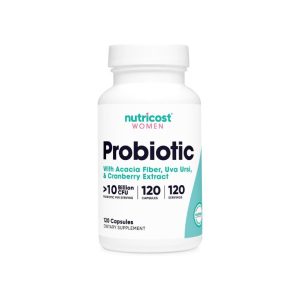

Key product features
What you should know
Nutricost Probiotic for Women is designed specifically for women, combining a multi-strain probiotic complex with fiber and herbs to support heart, digestive, and urinary tract health.
- Many customers report these probiotics are easy to swallow and effective in improving digestive and urinary health. Some find it inconvenient to keep these refrigerated.
- Priced at $0.15 per dose, this offers the best value, especially with a 120-day supply and a money-back guarantee.
- This is ideal for women seeking comprehensive support for gut, heart, and urinary health, particularly people with IBS trying to avoid unnecessary antibiotic use. Two extracts, cranberry and uva ursi, help support urinary health.
- It’s available in two probiotic strengths, 10 billion CFU and 60 billion CFU, allowing you to start low and increase dosage if needed.
Why we like Nutricost Probiotic for Women as best for women
Nutricost offers one of the only probiotic supplements designed for women. It combines a multi-strain probiotic complex with fiber and herbs that support heart, digestive, and urinary tract health, all important to women’s well-being.
This multi-strain probiotic complex provides 10 different species of microbes known to help strengthen the gut and relieve uncomfortable symptoms of irritable bowel syndrome like bloating, gas, and diarrhea. (5)
Acacia fiber, a soluble fiber with potential gut and heart health benefits, is also included. (9) Heart disease is a major concern among women. (10)
This product really stands out because of the addition of two extracts that support women’s urinary health: cranberry and uva ursi. If an unbalanced gut microbiome is causing your IBS symptoms, getting a urinary tract infection (UTI) can worsen things. Antibiotic use, a standard treatment for urinary tract infections (UTIs), can further disrupt your microbiome. (11) Cranberry extract and uva ursi are commonly used herbal treatments for women’s urinary health, but many studies suffer from major drawbacks, limiting their application. (12) Nevertheless, the ingredients have potential and might be worth a try if you have frequent UTIs.
Third-party testing backs up the quality and safety of this product, and a 60-day money-back guarantee proves Nutricost stands behind its product. As an added convenience, we like that Nutricost offers a 120-day supply rather than the typical 30-day supply.
Best of all, this comes at an unmatched value. Each dose costs $0.15, which is as affordable as it gets for a probiotic supplement for IBS.
What to consider
This probiotic supplement requires refrigeration, which may make traveling tricky. We’d like to see more fiber in this supplement, as the 100 mg dose may be too small to make a notable or clinically relevant difference. And, the CFU count for each strain is not listed, making it difficult to assess their effectiveness.
What customers are saying
Only 36 customers have reviewed this product on Amazon, but the feedback is positive. With a 4.6 out of 5 average rating, customers like that this product is both affordable and effective.
“These probiotics seem to work just fine. Easy to swallow, no weird stomach issues. I appreciate the addition of cranberry, especially for urinary health.”
L. King, verified Amazon customer
Another reviewer, with the username “ShareTheLove,” commented, “This probiotic contains some of my favorite strains (L-rhamnosus and L-gasseri) plus some other goodies. The capsules have a pink tinge to them, presumably from the cranberry extract. Easy to swallow and no adverse effects. Third-party tested, which is a must. A great value for 4 months worth.”
The only significant complaint is that it’s inconvenient to refrigerate this product.
Specs
| Probiotic strains | Lactobacillus acidophilus, Lactobacillus plantarum, Lactobacillus rhamnosus, Lactococcus lactis, Lactobacillus casei, Saccharomyces boulardii, Bifidobacterium longum, Lactobacillus Fermentum, Bifidobacterium bifidum, Lactobacillus gasseri |
| CFUs | 10 billion or 60 billion |
| Other active ingredients | Organic acacia fiber (100 milligrams) |
| Other ingredients | Organic cranberry extract, uva ursi extract |
| Format | Capsule |
| Certifications | Third-party tested |
| Special diets | None specified |
| Dose | One capsule daily |
| Cost per dose | $0.15 |
| Doses per container | 120 |
Best probiotic for constipation: Pendulum Akkermansia
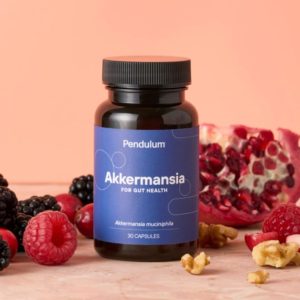

Key product features
What you should know
Pendulum Akkermansia is formulated with Akkermansia, a strain of probiotic that was discovered in 2004 that supports the gut lining.
- Pendulum Akkermansia provides 100 million AFUs of Akkermansia muciniphila to help support gut health.
- At $2.97 per dose, this is the most expensive product on our list.
- Those with IBS-C may find some relief from their symptoms when adding a probiotic to their diet.
Why we like Pendulum Akkermansia as best for constipation
IBS-C is characterized by irritable bowel syndrome with constipation. In those with IBS, gut bacteria is often different than that of those without it, so supplementing with probiotics can sometimes help. (13) Pendulum Akkermansia offers a unique and relatively new probiotic that may help reduce symptoms of IBS and constipation.
Pendulum Akkermansia is made with one strain of probiotic—Akkermansia muciniphila. This probiotic was only recently discovered in 2004, and is typically found in the mucus layer of the GI tract. (14)
Some research has found that Akkermansia may help reduce inflammation in the gut and strengthen the gut’s lining. (14) Another study on mice found supplementing with Akkermansia muciniphila helped reduce IBS-like symptoms. (15) While early results are promising, more research in humans needs to be done before confirming the probiotic’s benefits for IBS.
The capsules also contain a small amount of the prebiotic chicory inulin, which can help feed the good bacteria in your gut and may reduce constipation. (16)
These plant-based capsules are vegan friendly, so the supplement fits most dietary preferences.
What to consider
Since Akkermansia was discovered in 2004, more research is needed on the long-term effects of this probiotic. Much of the current research has been done in animals, so more human trials are needed. Some research shows correlations between high levels of Akkermansia and Parkinson’s and eczema, and that supplementation may not benefit those with IBD. (17) As with any treatment for a condition like IBS, you should consult with your doctor before taking this supplement.
If you opt to buy a single bottle of this product, it will cost you $89, or $2.97 per serving. You can save money by purchasing a one-, three-, or six-month subscription.
What customers are saying
Pendulum Akkermansia has over 830 reviews on Amazon with an average rating of 4.2 out of 5 stars. Reviewers noted the pill size is easy to take and expressed positive benefits from the product related to their gut health.
“I have IBS so these really help me to go! They help with stomach discomfort and bloating!”
Lorraine A., Amazon
However, the main complaint among reviewers was the price tag, and some report negative side effects, like stomach pain.
“I couldn’t even sleep, in so much stomach pain, bloat and feeling terrible from this. Trust me I was working with good doctors on the right path and then got this probiotic, which gets you sick. Gave it a week and threw it away,” said Amazon buyer Linda W.
Specs
| Probiotic strains | Akkermansia muciniphila |
| CFUs | 100 million |
| Other active ingredients | Chicory inulin |
| Other ingredients | Microcrystalline cellulose, hypromellose (vegetarian capsule), L-leucine, silica |
| Format | Capsule |
| Certifications | None |
| Special diets | Vegan |
| Dose | 1 capsule |
| Cost per dose | $2.97 |
| Doses per container | 30 |
Best probiotic for IBS bloating: Ora Organic Trust Your Gut
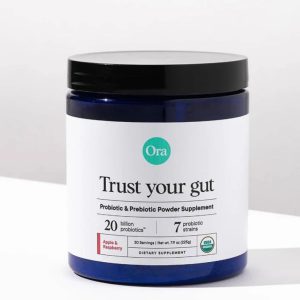

Key product features
What you should know
Ora Organic Trust Your Gut is our top choice for managing bloating due to its minimal ingredient list and effective probiotic strains.
- We like that this is a powder versus a capsule option and that you can add it to food or beverages. This versatility can make it easier to stick with.
- It’s priced at $1.67 per dose for a one-time purchase, which is on the higher end, but a subscription program and free shipping help make it more affordable.
- This product can be an excellent fit for people with IBS who are prone to bloating and prefer a non-pill option. It’s also good if you need a simple ingredient list to avoid food sensitivities.
- It contains 4.4 grams of inulin, a prebiotic that can enhance probiotic effectiveness but may cause gas. Most people do fine with doses under 8 grams daily.
- The powder comes in apple raspberry and lavender lemonade flavors, and uses acid-resistant strains to ensure probiotics reach the intestines intact.
Why we like Ora Organic Trust Your Gut as best for bloating
Bloating is an uncomfortable symptom of IBS. Reasons for bloating are highly variable, but a product like Ora Organic Trust Your Gut contains a well-formulated probiotic blend to help provide relief.
A recent meta-analysis looked at bloating symptoms across 39 studies involving over 3000 patients using probiotics to manage IBS symptoms. It found a few strains particularly helpful for reducing bloating and more superior than placebo, including Lactobacillus plantarum, which is featured in this product. (18) Additionally, Ora Organic Trust Your Gut contains Lactobacillus acidophilus and Bifidobacterium lactis both known to help with a variety of IBS symptoms. This combination makes for a well-rounded formula to address a wide range of digestive concerns. (6)
Ora’s minimal ingredient list is another reason this is a good option for those prone to bloating. Fewer ingredients reduce the chance of triggering a food sensitivity that worsens symptoms. One caveat: Trust Your Gut contains 4.4 grams of the prebiotic fiber inulin. Prebiotics work with your probiotic to support effectiveness, but they are also known to cause gas. However, most people do fine with doses under eight grams daily. (19)
We like that this is a non-pill option. Instead, it’s a powder that comes in two well-liked flavors—apple raspberry and lavender lemonade. You can mix the powder into water or food, adding to its versatility. To ensure that these healthy microbes reach your intestines intact, Ora selected acid-resistant strains. These strains are suited to survive the journey through the digestive tract without a protective capsule.
This also scored top marks for ingredient trust and transparency. It’s third-party tested for purity and potency; testing results are available on the company’s website. It’s also certified organic.
What to consider
A one-time purchase provides a 30-day supply at a cost of $1.67 per dose, which puts it on the high end. A subscription program and free shipping help improve affordability.
Since this product contains prebiotic fiber, some people may experience flatulence. This product is in powder form rather than a pill, so you’ll have to mix it into water or a smoothie.
What customers are saying
This is a well-liked product on Amazon, with over 2,500 customers providing an average rating of 4.3 out of 5. Reviewers highlight its great taste, ease of mixing, and results as the best features.
“The quality and effectiveness of this product are excellent. Plus, it tastes good and has a good texture. I add it to a full glass of water and add a splash of pure cranberry juice. It dissolves completely and tastes good. My husband likes the flavor, too.”
Username “Buyer,” verified Amazon customer
Buyer Amanda W. also weighed in, sharing that she “saw a significant improvement with bloating, sleeping, and overall energy level” within a week.
Of course, since gut health is so individualized, it won’t work for everyone, and some reviewers shared disappointment with their results.
Specs
| Probiotic strains | Lactobacillus acidophilus DDS-1, Lactobacillus plantarum UALp-05, Bifidobacterium lactis UABla-12, Lactobacillus reuteri UALre-16, Bifidobacterium bifidum UABb-10, Bifidobacterium breve UABbr-11, Bifidobacterium longum UABI-14 |
| CFUs | 20 billion |
| Other active ingredients | Organic Jerusalem artichoke inulin, organic tapioca oligosaccharide |
| Other ingredients | Organic apple powder (organic apple, organic rice), organic raspberry |
| Format | Powder |
| Certifications | Third-party tested, organic, non-GMO |
| Special diets | Vegan, gluten-free, soy-free, nut-free |
| Dose | One scoop daily |
| Cost per dose | $1.67 |
| Doses per container | 30 |
Best probiotic for men with IBS: Sports Research Daily Probiotics
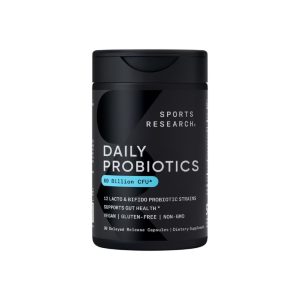

Key product features
What you should know
Sports Research Probiotic is a top choice for men for managing IBS due to its multi-strain formula and added prebiotic fiber. Delayed-release capsules help ensure the probiotics reach your intestines, where they work the best and are most needed.
- We like that you get a high dose of twelve probiotic strains (60 billion CFUs) in just one capsule. Many other brands require taking two.
- Priced at $0.93 per dose, this is the second most affordable probiotic on our list.
- This is a great option for individuals with IBS since it combines probiotics to help manage IBS symptoms with inulin, a fiber that can help keep you regular.
- The high dose of inulin (60 milligrams) can cause bloating and gas. Build up slowly to one capsule daily so your body has time to adjust.
Why we like Sports Research Daily Probiotics as best for men
Sports Research Daily Probiotics is a great multi-strain probiotic option to support men’s gut health. The added inulin, a prebiotic fiber, helps make it a solid choice for managing constipation. Best of all, these benefits are provided at a hard-to-beat price.
Multi-strain probiotic formulas may be better than single strains as the different microbes work together to provide additive benefits to gut health. (5, 20) Sports Research has carefully selected 12 diverse Lactobacillus and Bifidobacterium probiotics strains. These types are the most well-studied for their potential to improve the most common symptoms of IBS. (2)
One study found that supplementing with probiotics may help improve male fertility as well, specifically a blend of the following strains: Lactobacillus casei, Lactobacillus rhamnosus, Lactobacillus bulgaricus, Lactobacillus acidophilus, Bifidobacterium breve, Bifidobacterium longum, and Streptococcus thermophilus. (21) Five of these strains are included in Sports Research Daily Probiotics.
In addition, this product provides inulin, a prebiotic fiber that feeds the healthy microbes in your gut, helping them thrive so you can feel better. Inulin may also provide relief for constipation on its own. One study found 10 grams taken over five weeks improved motility and stool frequency in adults with sluggish bowels. (22)
Keep in mind, however, though some data suggests 10 grams may be sufficient for regularity for those suffering from constipation, Sports Research contains just a fraction of that dose with 60 milligrams. In other words, you’d need 166 servings just to get the 10 gram dose.
Sports Research does provide a generous dose of probiotics: 60 billion CFUs per capsule. Not only is this the third-highest dosage of the products on our list, but you get it all in one capsule, while many others require two. Moreover, Sports Research uses a delayed-release capsule. This ensures the probiotics are protected from stomach acid as they travel through your gastrointestinal system to reach your lower intestines, where they do their best work. We also like that this product is shelf-stable, making it convenient to take on-the-go.
All this is provided for a very reasonable $0.93 cost per dose, making it the second most affordable probiotic we recommend for men with IBS.
Check out our Sports Research Daily Probiotic review for more information on this product.
Related: The best probiotics for men
What to consider
One note about inulin: it’s a fermentable fiber that produces gas in your colon, which can cause gas and bloating. (23)
If you’re unhappy with the product and want to make a return, there are a few things to pay attention to. Unlike most products, where the return window starts upon delivery, the 45-day return window starts on the shipment date. You must include a valid receipt and return authorization number with the product, and can only return the same item for a refund one time.
What customers are saying
Customers really like this product. Over 2,000 Amazon reviewers gave it an average 4.6 out of 5 rating. They’re happy with the results and appreciate that it’s affordable and easy to take.
“Would highly recommend this product to anyone suffering with stomach issues and problems. I’ve only taken it for maybe four days now, and I’ve already seen improvements.”
Amanda, verified Amazon customer
Brenda B. also feels this is a “great product for the price” and shares, “I have IBS-C. These seem to help me be regular! I also find them easy to swallow!”
However, Mitch, another verified customer, found it ineffective, sharing that “after 30 days, I didn’t notice a gut health difference.” On the plus side, he also had “no side effects.”
Some people, like Eric W., felt their digestive symptoms worsened, but recognized, “This does not mean that this product will not be beneficial for you.”
Specs
| Probiotic strains | L. plantarum, Lactococcus lactis subsp. lactis, B. animalis subsp. lactis, L. acidophilus, L. fermentum, L. rhamnosus GG, L. casei, L. paracasei, B. bifidum, B. breve, B. longum subsp. infantis, B. longum subsp. longum |
| CFUs | 60 billion |
| Other active ingredients | Inulin blend (60 milligrams) |
| Other ingredients | Potato starch, delayed-release veggie capsule (hypromellose, gellan gum, purified water), L-leucine, pectin |
| Format | Capsule |
| Certifications | Certified vegan, non-GMO |
| Special diets | Gluten-free, vegan |
| Dose | One capsule daily |
| Cost per dose | $0.93 |
| Doses per container | 30 |
How we score the best probiotics for IBS
Every probiotic we review is rated across six primary categories. Each category is assigned a different percentage weight of the total score based on its relative importance when considering whether or not you should purchase a plant-protein product. Plant protein powders can also earn bonus credits that boost the overall rating for third-party testing credentials from NSF, Labdoor, and more.
You can check out our complete probiotic testing methodology here.
Exclusion of proprietary blends—25%
To make an informed choice when selecting probiotic supplements, it’s important to look for products that provide clear information about the specific strains of probiotics contained in the formulation. Proprietary blends often do not disclose the specific strains and their respective concentrations used in the product. Consumers cannot make informed decisions about the probiotic supplement without knowing the specific strains and their concentrations. Different probiotic strains have different health benefits, and the effectiveness of a product depends on the specific strains used and their viability.
Cultures contained—25%
The effectiveness of a probiotic product depends on the strains it contains, as different probiotic strains offer various health benefits. For example, some strains support digestive health, while others may help with immune function or address specific health conditions such as irritable bowel syndrome (IBS). It’s important to select probiotic strains that align with your health goals and needs. Probiotics are identified by their specific strain, which includes the Genus–or classification, or family–and species, which is a further identification within the “family” along with a strain designation.
Whether they’re encapsulated with a food source—20%
Encapsulating probiotics with a food source like inulin can help protect the beneficial bacteria from harsh stomach acids and bile, increasing their chances of survival as they pass through the digestive system and reach the intestines where they are needed. This encapsulation can provide a protective barrier, potentially extending the shelf life of the probiotic supplement.
Whether cultures are alive—15%
According to an expert panel on probiotics and prebiotics, “Probiotics are live microorganisms which when administered in adequate amounts confer a health benefit on the host.” While most of the data support live and active cultures, some data suggest dead cultures could exert benefit as well, though they aren’t labeled as such and may be referred to as postbiotics or parabiotics. Since the “live and active cultures” number is what’s stated on labels for probiotics, if at all, we evaluate products based on whether they include a statement on their label confirming the presence of viable microorganisms
Colony forming units (CFUs) at end of shelf life—10%
In the context of probiotics, CFUs represent the number of live microorganisms, typically bacteria, present in a probiotic supplement at the end of its shelf life. This value indicates the product’s potency and ability to deliver a sufficient quantity of live, beneficial microorganisms to exert their intended health effects. Generally speaking, it is better to have more strains and a variety of them, as our microbiome consists of approximately 38 trillion microbes. Therefore, it is best to have at least 20 billion or more CFUs, equivalent to a drop of water on a vast sea.
Form—5%
Probiotic supplements come in various forms, each with its own advantages and considerations. The choice of which form is best depends on individual preferences, needs, and factors such as convenience and lifestyle.
What is IBS?
Irritable bowel syndrome (IBS) is a digestive condition that affects about 11% of the population. (1) It’s a general diagnosis that can have multiple root causes, which means symptoms and treatments are highly individualized. However, there are four main types of IBS:
- IBS-D: Symptoms are mostly stomach pain and diarrhea
- IBS-C: Symptoms are mostly stomach pain and constipation
- IBS-Mixed: Symptoms alternate between diarrhea and constipation with stomach pain
- IBS-U: Undefined type, with symptoms ranging from diarrhea, constipation, stomach pain, cramping, bloating, abdominal distention, and more (24)
Treating IBS requires a holistic approach and a thorough investigation of the underlying causes of the symptoms. In some cases, an imbalance of organisms in the gut microbiome, called dysbiosis, is a major contributor to IBS symptoms. Diet and lifestyle factors and certain medications (like antibiotics) can disrupt the balance of good versus harmful bacteria in your gut. Restoring a healthy balance of organisms in the gut by consuming more probiotics (good bacteria) may help improve IBS symptoms. (1)
What are probiotics?
Probiotics are live microorganisms, including beneficial bacteria and yeasts, that naturally reside in your body and can also be found in certain foods and supplements. These friendly microbes are essential in maintaining a healthy gut by balancing the gut microbiome, which is unique to each person, like a fingerprint. While your body already hosts these helpful organisms, consuming probiotics through fermented foods like kefir, sauerkraut, kimchi, tempeh, yogurt, kombucha, miso, and pickles or supplements can boost their numbers, balance, and effectiveness. (2)
Probiotics contribute to gut health by out-competing harmful bacteria, strengthening the intestinal lining, boosting digestive health, and supporting the immune system. They are dosed in colony-forming units (CFUs), measuring the number of living cells present. Among the thousands of probiotic types, the most studied for their beneficial effects are from the Lactobacillus, Bifidobacterium, and Saccharomyces families of species. (2, 6)
Remember, each probiotic type works differently, and their effectiveness depends on choosing the right type for your specific health needs.
Are probiotics good for IBS?
Probiotics can be helpful for some people with irritable bowel syndrome (IBS), but the results aren’t consistent for everyone. Multiple studies have found that probiotics may improve overall symptoms, bloating, and gas in people with IBS. However, the quality of these studies varies, so specific recommendations are still unclear. (1, 5, 6)
Certain bacterial strains, like Lactobacillus rhamnosus and Lactobacillus acidophilus, have shown promise in reducing IBS symptoms like abdominal pain and bloating. (6) Other commonly used strains include those from the Bifidobacterium family and Saccharomyces boulardii. A 2022 clinical trial review also highlighted Bacillus coagulans as particularly effective for IBS relief, including constipation. (25)
Despite these positive findings, major health organizations like the American Gastroenterology Association do not officially support the use of probiotics for IBS because the evidence is still mixed. (26)
“It’s also important to note the doses used in these products must meet what’s been shown in research to be effective, if you want to understand their impact on your own body,” adds Mohr. “A study may include 60 grams of one ingredient, yet a product might just provide 10 mg, barely a fraction of the potentially effective dose.”
Nonetheless, many people with IBS have found symptom relief and improved quality of life from probiotics. Whether a specific probiotic will be effective for you depends on your symptoms and the underlying causes of your IBS. Your healthcare provider can help assess this as part of your overall IBS treatment plan. If probiotics are a viable option, you may need to do some trial and error to find the strains and dosage that work best for you. (5)
Keep in mind that, according to a recent meta-analysis, while probiotics are generally considered safe, they can sometimes worsen symptoms. (1) This is another reason to work closely with your healthcare provider on your treatment plan.
FAQs
Can IBS go away with probiotics?
Probiotics can’t make IBS go away, but they may offer symptom relief by helping balance the microbial environment within your gut. Probiotics bring more healthy microbes into your digestive tract. These friendly organisms can reduce inflammation, strengthen the gut lining, and improve digestion, which may address common IBS symptoms like gas, diarrhea, bloating, and constipation. (1, 5, 6)
What is the best probiotic if you have IBS?
Strains from the Lactobacillus and Bifidobacterium families have been studied the most for improving gut health, which can help relieve symptoms of irritable bowel syndrome. Specifically, Lactobacillus rhamnosus, Lactobacillus acidophilus, and Bifidobacterium animalis subsp. lactis are shown to help with bloating, abdominal pain, and bowel function. While single-strain options work, multi-strain blends appear to be most effective. (6)
What are foods to avoid if you have IBS?
Food triggers vary from person to person. However, experts commonly recommend a low-FODMAP diet as a treatment for irritable bowel syndrome. Low-FODMAP is a three-step elimination diet that restricts many hard-to-digest carbohydrates, including dairy, wheat, beans, and some fruits and vegetables. You gradually reintroduce these foods to help identify your specific food sensitivities. (24)
How can I reset my gut for IBS?
Resetting your gut health requires a comprehensive treatment plan, including diet changes, physical activity, stress management, and occasionally supplements. Because no two cases are alike, you should speak with a healthcare professional about the best plan for your gastrointestinal symptoms and health history. (24)
These statements have not been evaluated by the Food and Drug Administration. These products are not intended to diagnose, treat, cure, or prevent any diseases.Our experts
Victoria Burgess, Ph.D., CSCS, CISSN
Victoria Burgess earned her Ph.D. in Health and Human Performance from Concordia University Chicago and holds her NSCA CSCS and Certified Sports Nutritionist (CISSN). She is an adjunct professor in the Human Performance and Nutrition department at Concordia University Chicago & Parker University, where she teaches undergraduate, graduate, and doctoral-level courses.
Christopher Mohr, Ph.D., RD
Dr. Chris Mohr is an internationally recognized subject matter expert and speaker and performance coach. Through his facilitation and online resources, he works closely with some of the largest corporations in the world including Deloitte, Delta Airlines, Johnson & Johnson and more to help busy executives all over the world, develop the energy to thrive personally and professionally.
Jessica Coulon
Jessica is a contributing editor and writer for Fortune Recommends who specializes in fitness, health, nutrition, and science content. Previously, she was an editor for Popular Mechanics and Bicycling, where she covered pro cycling news, wrote how-to guides, and tested all the latest and greatest bike gear. She was also a regular shoe tester and contributor for Runner’s World. You can often find her skiing or riding her mountain bike, and racing with the F1RE female enduro team.
Lily Moe
Lily is a Brooklyn-based writer and editor with over seven years of experience in health media. As a former Fitness Coach, Lily’s editorial prowess has largely focused on fitness, nutrition, and weight management. She has also spent a fair share of time in testing labs, analyzing everything from protein powders to yoga mats. Her work has appeared in Verywell Fit, Verywell Mind, Health, and more.
Kelly Uhler
Kelly has a multifaceted background in elder care, health care, and copywriting. She has worked for organizations such as A Place For Mom and Homecare.com, which gave her the opportunity to work closely with families, providing reliable information to help them make informed decisions about their loved one’s health, safety, and quality of life.

Meghan Novoshielski, MS, RDN
Fortune Recommends Nutrition Writer
About Author
Meghan is a Registered Dietitian Nutritionist (RDN) with over 15 years of experience in the nutrition field. She holds a Master’s in Nutrition Science and Policy from Tufts University and has helped create evidence-based, highly effective products for brands like Nutrisystem and Wawa to improve people’s health. As an experienced health writer, Meghan is passionate about motivating people to pursue their healthiest lives through trustworthy, practical, and engaging nutrition content. These days her health and fitness goals are all about staying strong and active to keep up with her three young and very energetic children.
References
- Sun JR, Kong CF, Qu XK, Deng C, Lou YN, Jia LQ. Efficacy and safety of probiotics in irritable bowel syndrome: A systematic review and meta-analysis. Saudi Journal of Gastroenterology: Official Journal of the Saudi Gastroenterology Association. 2020;26(2):66-77. doi:https://doi.org/10.4103/sjg.SJG_384_19
- National Institutes of Health. Probiotics. Nih.gov. Published November 3, 2023. Accessed August 4, 2024. https://ods.od.nih.gov/factsheets/Probiotics-HealthProfessional/
- Davani-Davari D, Negahdaripour M, Karimzadeh I, et al. Prebiotics: Definition, Types, Sources, Mechanisms, and Clinical Applications. Foods. 2019;8(3):92. https://www.ncbi.nlm.nih.gov/pmc/articles/PMC6463098/
- Ma L, Tu H, Chen T. Postbiotics in Human Health: A Narrative Review. Nutrients. 2023;15(2):291. doi:https://doi.org/10.3390/nu15020291
- Dale HF, Rasmussen SH, Asiller ÖÖ, Lied GA. Probiotics in Irritable Bowel Syndrome: An Up-to-Date Systematic Review. Nutrients. 2019;11(9). doi:https://doi.org/10.3390/nu11092048
- Ceccherini C, Daniotti S, Bearzi C, Re I. Evaluating the Efficacy of Probiotics in IBS Treatment Using a Systematic Review of Clinical Trials and Multi-Criteria Decision Analysis. Nutrients. 2022;14(13):2689. doi:https://doi.org/10.3390/nu14132689
- Ankersen D, Weimers P, Bennedsen M, Haaber A, Fjordside E, Beber M, Lieven C, Saboori S, Vad N, Rannem T, Marker D, Paridaens K, Frahm S, Jensen L, Rosager Hansen M, Burisch J, Munkholm P. Long-Term Effects of a Web-Based Low-FODMAP Diet Versus Probiotic Treatment for Irritable Bowel Syndrome, Including Shotgun Analyses of Microbiota: Randomized, Double-Crossover Clinical Trial. J Med Internet Res 2021;23(12):e30291. URL: https://www.jmir.org/2021/12/e30291 DOI: 10.2196/30291
- Hanning N, Edwinson AL, Ceuleers H, et al. Intestinal barrier dysfunction in irritable bowel syndrome: a systematic review. Therapeutic Advances in Gastroenterology. 2021;14:175628482199358. doi:https://doi.org/10.1177/1756284821993586
- Jarrar AH, Stojanovska L, Apostolopoulos V, et al. The Effect of Gum Arabic (Acacia senegal) on Cardiovascular Risk Factors and Gastrointestinal Symptoms in Adults at Risk of Metabolic Syndrome: A Randomized Clinical Trial. Nutrients. 2021;13(1):194. doi:https://doi.org/10.3390/nu13010194
- CDC. About Women and Heart Disease. Heart Disease. Published April 29, 2024. Accessed August 4, 2024. https://www.cdc.gov/heart-disease/about/women-and-heart-disease.html
- Schwartz DJ, Langdon AE, Dantas G. Understanding the impact of antibiotic perturbation on the human microbiome. Genome Medicine. 2020;12(1). doi:https://doi.org/10.1186/s13073-020-00782-x
- Das S. Natural therapeutics for urinary tract infections—a review. Future Journal of Pharmaceutical Sciences. 2020;6(1). doi:https://doi.org/10.1186/s43094-020-00086-2
- Cleveland Clinic. Irritiable Bowel Syndrome. https://my.clevelandclinic.org/health/diseases/4342-irritable-bowel-syndrome-ibs
- Pellegrino, A., Coppola, G., Santopaolo, F., Gasbarrini, A., & Ponziani, F. R. (2023). Role of Akkermansia in Human Diseases: From Causation to Therapeutic Properties. Nutrients, 15(8), 1815. https://doi.org/10.3390/nu15081815
- Meynier, M., Daugey, V., Mallaret, G., Gervason, S., Meleine, M., Barbier, J., Aissouni, Y., Lolignier, S., Bonnet, M., Ardid, D., De Vos, W. M., Van Hul, M., Suenaert, P., Brochot, A., Cani, P. D., & Carvalho, F. A. (2024). Pasteurized akkermansia muciniphila improves irritable bowel syndrome-like symptoms and related behavioral disorders in mice. Gut microbes, 16(1), 2298026. https://doi.org/10.1080/19490976.2023.2298026
- Araújo, M. M., & Botelho, P. B. (2022). Probiotics, prebiotics, and synbiotics in chronic constipation: Outstanding aspects to be considered for the current evidence. Frontiers in nutrition, 9, 935830. https://doi.org/10.3389/fnut.2022.935830
- Chiantera, V., Laganà, A. S., Basciani, S., Nordio, M., & Bizzarri, M. (2023). A Critical Perspective on the Supplementation of Akkermansia muciniphila: Benefits and Harms. Life (Basel, Switzerland), 13(6), 1247. https://doi.org/10.3390/life13061247
- Xie P, Luo M, Deng X, Fan J, Xiong L. Outcome-Specific Efficacy of Different Probiotic Strains and Mixtures in Irritable Bowel Syndrome: A Systematic Review and Network Meta-Analysis. Nutrients. 2023;15(17):3856-3856. doi:https://doi.org/10.3390/nu15173856
- Ripoll C, Flourié B, Megnien S, Hermand O, Janssens M. Gastrointestinal tolerance to an inulin-rich soluble roasted chicory extract after consumption in healthy subjects. Nutrition. 2010;26(7-8):799-803. doi:https://doi.org/10.1016/j.nut.2009.07.013
- Kwoji ID, Aiyegoro OA, Okpeku M, Adeleke MA. Multi-Strain Probiotics: Synergy among Isolates Enhances Biological Activities. Biology. 2021;10(4):322. doi:https://doi.org/10.3390/biology10040322
- Helli, B., Kavianpour, M., Ghaedi, E., Dadfar, M., & Haghighian, H. K. (2020). Probiotic effects on sperm parameters, oxidative stress index, inflammatory factors and sex hormones in infertile men. Human Fertility, 25(3), 499–507. https://doi.org/10.1080/14647273.2020.1824080
- Watson AW, Houghton D, Avery PJ, et al. Changes in stool frequency following chicory inulin consumption, and effects on stool consistency, quality of life and composition of gut microbiota. Food Hydrocolloids. 2019;96:688-698. doi:https://doi.org/10.1016/j.foodhyd.2019.06.006
- Qin YQ, Wang LY, Yang XY, et al. Inulin: Properties and health benefits. Food & Function. Published online 2023. doi:https://doi.org/10.1039/d2fo01096h
- National Institute of Diabetes and Digestive and Kidney Diseases. Irritable Bowel Syndrome (IBS). National Institute of Diabetes and Digestive and Kidney Diseases. Published January 16, 2019. Accessed August 4, 2024. https://www.niddk.nih.gov/health-information/digestive-diseases/irritable-bowel-syndrome
- Zhang T, Zhang C, Zhang J, Sun F, Duan L. Efficacy of Probiotics for Irritable Bowel Syndrome: A Systematic Review and Network Meta-Analysis. Frontiers in Cellular and Infection Microbiology. 2022;12. doi:https://doi.org/10.3389/fcimb.2022.859967
- Su GL, Ko CW, Bercik P, et al. AGA Clinical Practice Guidelines on the Role of Probiotics in the Management of Gastrointestinal Disorders. Gastroenterology. 2020;159(2). doi:https://doi.org/10.1053/j.gastro.2020.05.059
